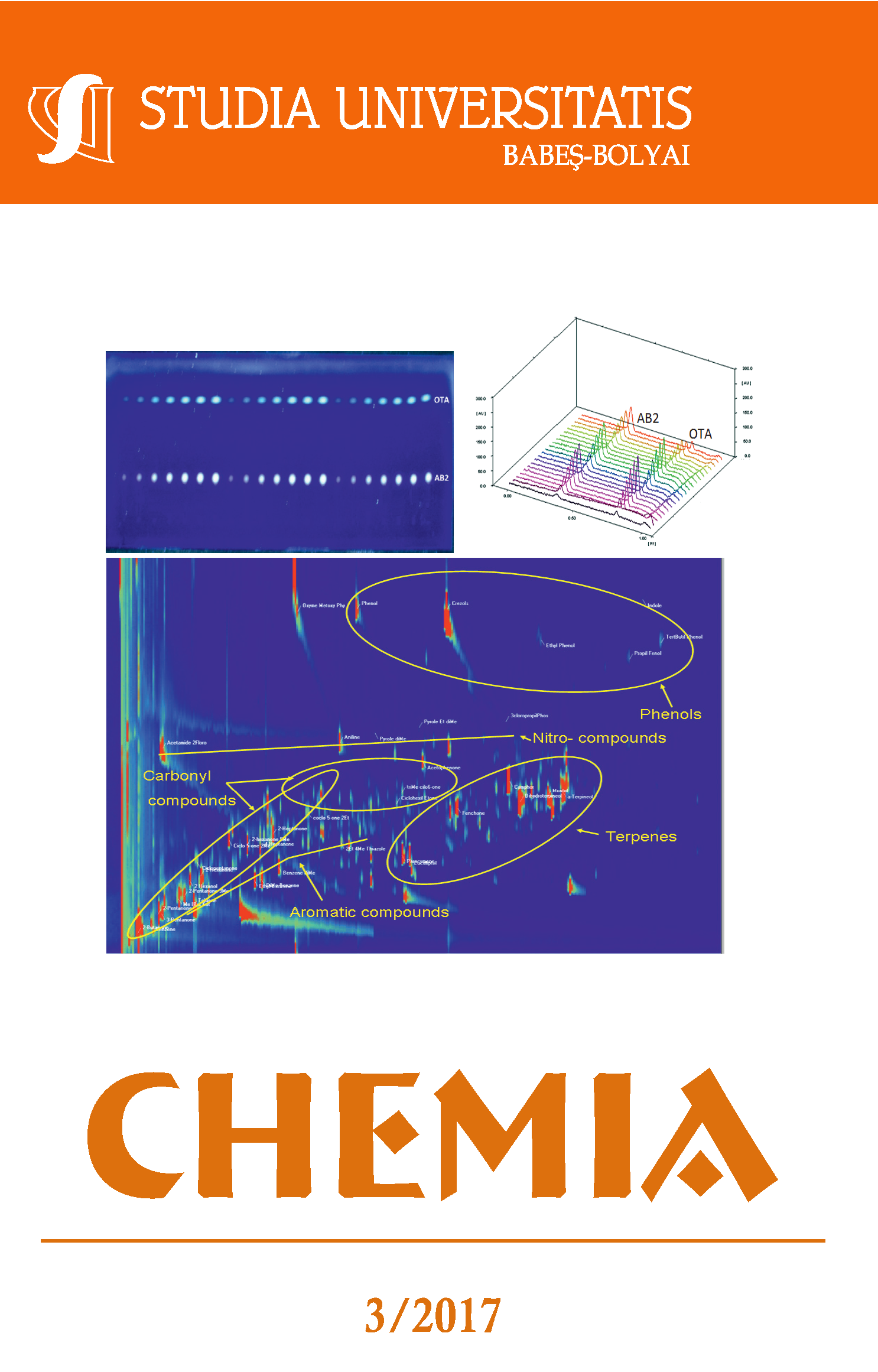ELECTROCHEMICAL SENSORS FOR MALACHITE GREEN BASED ON CARBONACEOUS NANOMATERIALS
DOI:
https://doi.org/10.24193/subbchem.2017.3.11Keywords:
Malachite Green; electrochemical detection; activated carbon; carbon nanotubes; reduced graphene oxide; modified electrodesAbstract
Synthetic dyes are widely used in many fields, such as textile industry, plastics, cosmetics, paper industry and many others. Due to their toxicity, they should be removed from wastes before discharging in the environment. In order to determine the efficiency of the removal process, different methods are used to detect traces of dyes in wastewaters. The most used are spectrophotometry and FIA, however the expensive equipment and complicated testing process make these methods difficult to use. On the contrary, electrochemical sensors have multiple advantages such as short response time, low price and easiness to use. In this context, several electrochemical sensors based on new carbonaceous materials were developed and characterized. Carbon nanotubes, graphene and activated carbon from Abies nordmanniana cones together with Nafion were used to modify the surface of a glassy carbon electrode by drop casting. The resulting modified electrodes were tested by SWASV and amperometry for Malachite Green detection in aqueous solutions, having low detection limits in the order of μM.
References
F. Chequer, G. Rodrigues de Oliveira, E. Ferraz, J. Cardoso, M. Zanoni, D. Palma de Oliveira, “Eco-Friendly Textile Dyeing and Finishing”, 2013, InTech.
G. Booth, “Dyes, General Survey”, 2000, Wiley-VCH.
M.T. Yagub, T.K. Sen, S. Afroze, H.M. Ang, Advances in Colloid and Interface Science, 2014, 209: 172-184.
A. Hazrat, Water, Air, & Soil Pollution, 2010, 213(1), 251.
P. Saravanan, P. Sivakumar, T. Suganya, N Nagendra, S. Renganathan, Indian Journal of Environmental Protection, 2012, 32(3): 249.
Y. Sun, Y. Yin, J. Zhang, H. Yu, X. Wang, Environmental Toxicology, 2006, 21(12): 256.
E. Daneshvar, M. Kousha, N. Koutahzadeh, M. Sohrabi, A. Bhatnagar, Environmental Progress & Sustainable Energy, 2013, 32(2), 285.
A. Panandiker, C. Fernandes, K.Rao, Cancer Letters, 1992, 67, 93.
S. Srivastava, R. Sinha, D. Roy, Aquatic Toxicology, 2004, 66, 319.
G. Crini, Bioresource Technology, 2006, 97(9), 1061-86.
F.H. Wu, G.C. Zhao, X.W. Wei, Electrochemistry Communications, 2002, 4, 690.
L.M. Ochiai, D. Agustini, L. Figueiredo-Filho, C.E. Banks, L.H. Marcolino-Junior, M.F. Bergamini, Sensors and Actuators B, 2017, 241: 978.
M. Zhou, Y. Zhai, S. Dong, Analytical Chemistry, 2009, 81, 5603.
H. Liu, K. Guo, C. Duan, X. Dong, J. Gao, Biosensors and Bioelectronics, 2017, 87, 473.
M. Mijanur-Rahman, M. Mollah, M. Muhibur-Rahman, A. Hasan-Susan, Hindawi Publishing Corporation, 2013, Article ID 839498; doi.org/10.1155/2013/839498.
Z. Galus, R. N. Adams, Journal of the American Chemical Society, 1964, 86, 1666.
A.M. Sacara, C. Cristea, L.M. Muresan, Journal of Electroanalytical Chemistry, 2017, 792, 23.
G.I. Turdean, G. Szabo, Food Chemistry, 2015, 179, 325.
ec.europa.eu/DocsRoom/documents/19163/attachments/1/.../pdf viewed in June, 2017
A.M. Săcară, C. Indolean, L.M. Mureşan, Studia UBB Chemia, 2016, 61 (3),183.
Downloads
Published
How to Cite
Issue
Section
License
Copyright (c) 2017 Studia Universitatis Babeș-Bolyai Chemia

This work is licensed under a Creative Commons Attribution-NonCommercial-NoDerivatives 4.0 International License.



